
Winnie Madikizela-Mandela, also known as Winnie Mandela, was a South African anti-apartheid activist, convicted kidnapper, politician, and the second wife of Nelson Mandela. She served as a Member of Parliament from 1994 to 2003, and from 2009 until her death, and was a deputy minister of arts and culture from 1994 to 1996. A member of the African National Congress (ANC) political party, she served on the ANC's National Executive Committee and headed its Women's League. Madikizela-Mandela was known to her supporters as the "Mother of the Nation".

Wilbur Addison Smith was a Northern Rhodesian-born British-South African novelist specializing in historical fiction about international involvement in Southern Africa across four centuries.
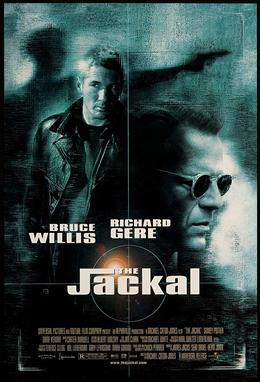
The Jackal is a 1997 American action thriller film directed by Michael Caton-Jones, and starring Bruce Willis, Richard Gere, and Sidney Poitier in his final theatrically released film role. The film involves the hunt for a paid assassin. It is a loose take on the 1973 film The Day of the Jackal, which starred Edward Fox, and was based on the 1971 novel of the same name by Frederick Forsyth. Although the film earned mostly negative reviews from critics, it was a commercial success and grossed $159.3 million worldwide against a $60 million budget.

Shout at the Devil is a 1976 British war adventure film directed by Peter R. Hunt and starring Lee Marvin and Roger Moore. The film, set in Zanzibar and German East Africa in 1913–1914, is based on a novel by Wilbur Smith which is very loosely inspired by real events. The supporting cast features Barbara Parkins and Ian Holm.
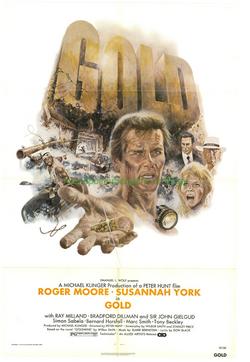
Gold is a 1974 British thriller film starring Roger Moore and Susannah York and directed by Peter R. Hunt. It was based on the 1970 novel Gold Mine by Wilbur Smith. Moore plays Rodney "Rod" Slater, general manager of a South African gold mine, who is instructed by his boss Steyner to break through an underground dike into what he is told is a rich seam of gold. Meanwhile, he falls in love with Steyner's wife Terry, played by York. In the United States, the film was released only as part of a double bill with The Taking of Pelham One Two Three.

The Deceiver is a novel by English writer Frederick Forsyth, about a retiring agent of the British SIS named Sam McCready. He is the head of Deception, Disinformation and Psychological Operations, and his maverick but brilliant successes have led to his nickname "The Deceiver." The stories had previously been filmed as Frederick Forsyth Presents, a miniseries for British television, in 1989 and 1990, with McCready played by Alan Howard. The book followed in 1991. It appeared in The New York Times's list of the best-selling books for eight weeks, and its peak was #6.

The Dogs of War (1974) is a war novel by British writer Frederick Forsyth, featuring a small group of European mercenary soldiers hired by a British industrialist to depose the government of the fictional African country of Zangaro. The story details a geologist's mineral discovery, and the preparations for the attack: soldier recruitment, training, reconnaissance, and the logistics of the coup d'état. Like most of Forsyth's work, the novel is more about the protagonists' occupational tradecraft than their characters. The source of the title, The Dogs of War, is Act III, scene 1, line 270 of Julius Caesar (1599), by William Shakespeare: Cry, 'Havoc!', and let slip the dogs of war.
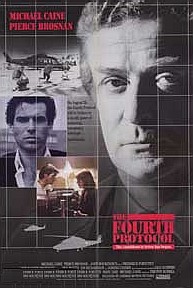
The Fourth Protocol is a 1987 British Cold War spy film starring Michael Caine and Pierce Brosnan. Directed by John Mackenzie, it is based on the 1984 novel The Fourth Protocol by Frederick Forsyth.
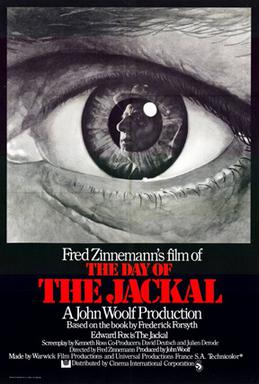
The Day of the Jackal is a 1973 political thriller film directed by Fred Zinnemann and starring Edward Fox and Michael Lonsdale. Based on the 1971 novel of the same name by Frederick Forsyth, the film is about a professional assassin known only as the "Jackal" who is hired to assassinate French president Charles de Gaulle in the summer of 1963.

Dark of the Sun is a 1968 British adventure war film starring Rod Taylor, Yvette Mimieux, Jim Brown, and Peter Carsten. The film, which was directed by Jack Cardiff, is based on Wilbur Smith's 1965 novel, The Dark of the Sun. The story about a band of mercenaries sent on a dangerous mission during the Congo Crisis was adapted into a screenplay by Ranald MacDougall. Critics condemned the film on its original release for its graphic scenes of violence and torture.

When the Lion Feeds (1964) is the debut novel of Rhodesian writer Wilbur Smith. It introduces the Courtney family, whose adventures Smith would tell in many subsequent novels. In 2012, Smith said the novel remained his favourite because it was his first to be published.
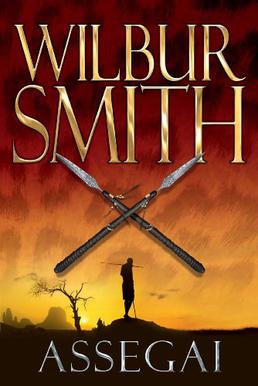
Assegai is Wilbur Smith's thirty-second novel, it follows The Triumph of the Sun in which the author brought the Courtney and Ballantyne series together. Assegai tells the story of Leon Courtney and is set in 1906 in Kenya. The events in the story are linked to and precede the outbreak of World War One.
The Courtney Novels are a series of seventeen novels published between 1964 and 2019 by Wilbur Smith. They chronicle the lives of the Courtney family, from the 1660s through until 1987. The novels can be split into three parts; the original trilogy of novels follow the twins Sean and Garrick Courtney from the 1860s until 1925. The second part is five books which follows Centaine de Thiry Courtney, her sons and grandchildren between 1917 and 1987. The third part, the most recently written, follows the Courtney family from the 1660s through until 1939, focusing on successive generations of the family. There are also two books that follow the third series. As well, there are three additional Courtney books.

A Sparrow Falls is a 1977 novel by Wilbur Smith. It is one of the Courtney Novels and is set during and after World War I.
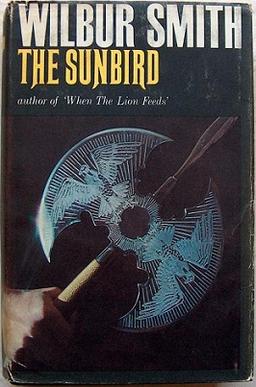
The Sunbird is a 1972 novel by Wilbur Smith about an archeological dig. The novel depicts a search for a Phoenician city in modern Botswana.

The Burning Shore is a novel by Wilbur Smith set during and after World War I.
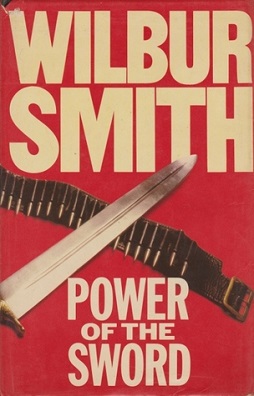
Power of the Sword (1986) is a novel by Wilbur Smith set before and during World War II.

Rage is a 1987 novel by Wilbur Smith set in the Union of South Africa, immediately following World War II. It starts in 1952 and goes until the late 1960s, touching on the country's declaration of a republic and the subsequent Sharpeville Massacre. The plot centers around Shasa Courtney and black resistance leader Moses Gama.

The Triumph of the Sun is a novel by Wilbur Smith set during the Siege of Khartoum. Smith himself said the following about the novel:
"That incident had all the elements of a great story setting because you have the captive characters who are having to interact with each other because there is no escape – siege conditions. Also the river. I’m fascinated by the great rivers of Africa. Played against that was a sort of island setting in the desert. Then it had such powerful influences at work – the British Empire against the revolting Mahdists, the conflict of religions, Gordon and the Mahdi, both of them totally fanatical, believing that they spoke directly to God, and unbendable and unbending."
The Death of Me Yet is a 1971 television film directed by John Llewellyn Moxey and starring Doug McClure and Darren McGavin. It based on the 1970 novel of the same name by Whit Masterson. The movie appeared on the ABC Movie of the Week on October 26, 1971.


















